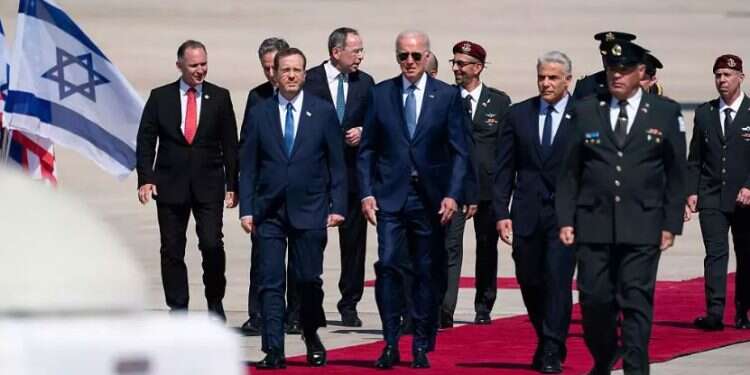US President Joe Biden departed Israel for Saudi Arabia on Friday afternoon, where he will discuss energy supply, human rights, and security cooperation on a trip designed to reset the US relationship with a country he once pledged to make a "pariah" on the world stage.
Follow Israel Hayom on Facebook, Twitter, and Instagram
A farewell ceremony that had been planned to take place at Ben-Gurion International Airport ahead of the presidential departure was cut short, to take place with no speeches, Kan 11 News reported Friday afternoon. The curtailed ceremony came at Israel's initiative, due to concerns that it could end too close to the start of the Sabbath.
In Saudi Arabia, Biden will hold meetings with Saudi King Salman bin Abdulaziz and Crown Prince Mohammed bin Salman, known as MbS, along with other government officials, a senior Biden administration official told reporters.
The visit will be closely watched for body language and rhetoric. US intelligence concluded that MbS directly approved the 2018 murder of Washington Post columnist Jamal Khashoggi, while the crown prince denies having a role in the killing.
White House advisers have declined to say whether Biden will shake hands with the prince, the kingdom's de facto ruler. Biden will meet with a broader set of Arab leaders at a summit in the Red Sea port city of Jeddah on Saturday.
"The president's going to meet about a dozen leaders and he'll greet them as he usually does," the administration official said.
At the start of Biden's trip to the Middle East, officials said he would avoid close contacts, such as shaking hands, as a precaution against COVID-19. But the president ended up engaging in hand-shaking in Israel.
Biden said on Thursday his position on Khashoggi's murder was "absolutely" clear. Biden made his "pariah" comment less than two years ago after the journalist's killing and while campaigning for president.
Biden said he would raise human rights in Saudi Arabia, but he did not say specifically if he would broach the Khashoggi murder with its leaders.
Saudi ambassador to the United States Reema bint Bandar Al Saud, writing in US magazine Politico, reiterated the kingdom's "abhorrence" of the killing, describing it as a gruesome atrocity, and said it cannot define US-Saudi ties.
She said the relationship should also not be seen in the "outdated and reductionist" oil-for-security paradigm.
Subscribe to Israel Hayom's daily newsletter and never miss our top stories!
"The world has changed and the existential dangers facing us all, including food and energy security and climate change, cannot be resolved without an effective US-Saudi alliance."
Energy and security interests prompted the president and his aides to decide not to isolate the kingdom, the world's top oil exporter and regional powerhouse that has been strengthening ties with Russia and China, particularly at a time of Gulf concern over perceived US disengagement from the region.
The United States is eager to see Saudi Arabia and its OPEC partners pump more oil to help bring down the high cost of gasoline and ease the highest US inflation in four decades.
"The Saudis definitely are intending to boost capacity and with oil prices so high they have the wherewithal to do that, particularly as they see production constraints elsewhere in a market that is still growing," said Daniel Yergin, S&P Global vice chairman and an expert in world energy markets.
Biden will encourage peace and press for a more integrated Middle East during his trip, the administration official said. Topics would include strengthening a truce in the war in Yemen, "balance" in energy markets and technological cooperation in 5G and 6G.
Ahead of the visit, Saudi Arabia said it would open its airspace to all air carriers, paving the way for more overflights to and from Israel, in what Biden described as a historic and important step towards building a more integrated and stable Middle East.
"Thanks to months of steady diplomacy between my administration and Saudi Arabia, it is finally a reality," Biden said in a statement. "I will do all that I can, through direct diplomacy and leader-to-leader engagement, to keep advancing this groundbreaking process."
Biden will be the first American president to fly from Israel directly to Jeddah, a step the White House says represents a "small symbol" of warming Israeli-Saudi ties. Two years ago, Riyadh gave a tacit nod for the United Arab Emirates and Bahrain to normalise relations with Israel.




